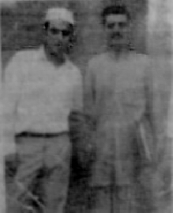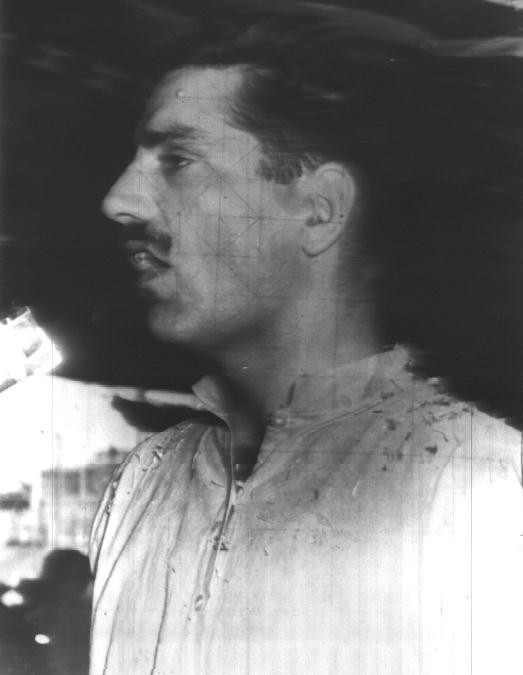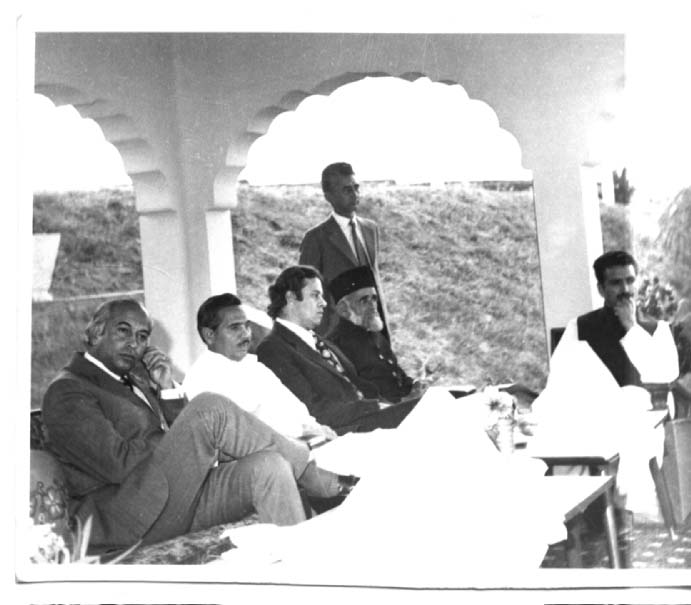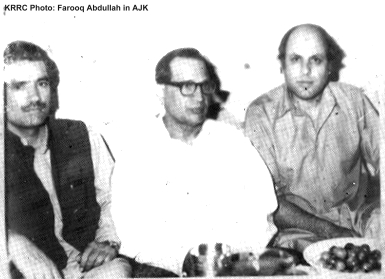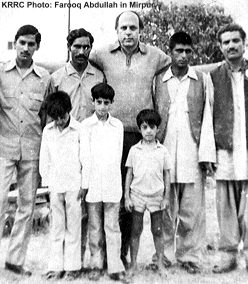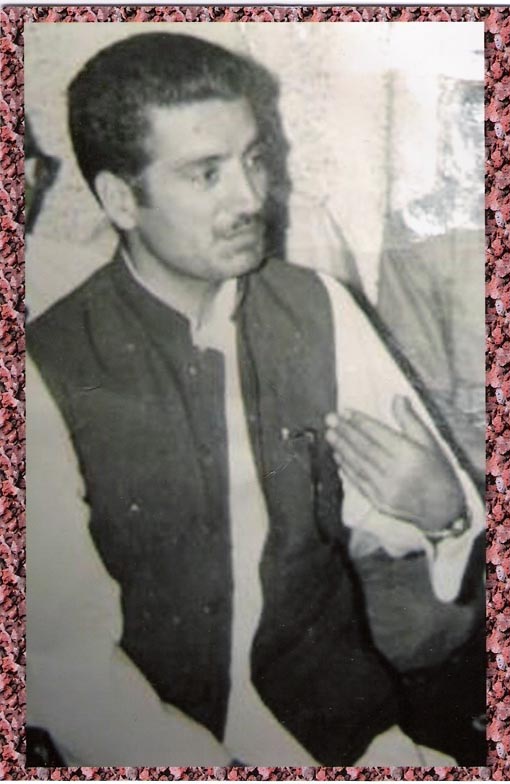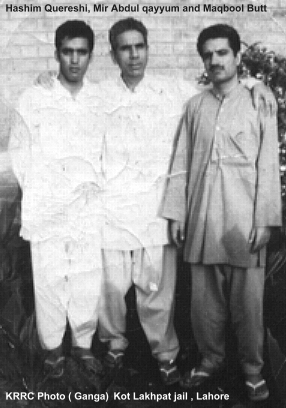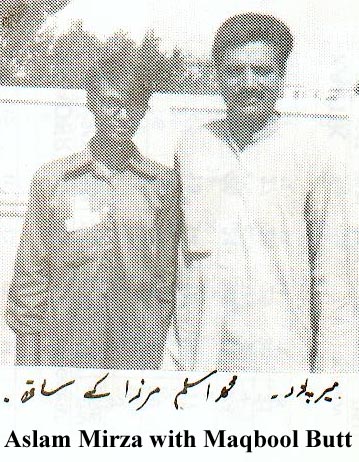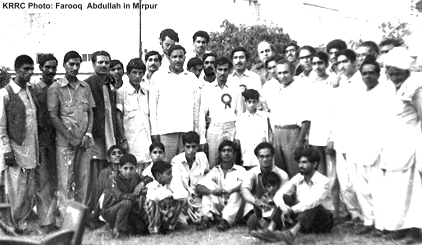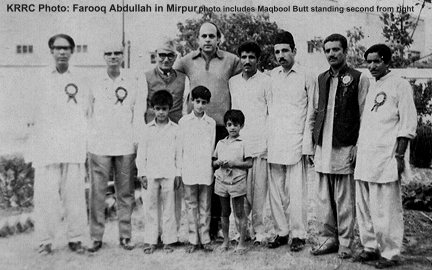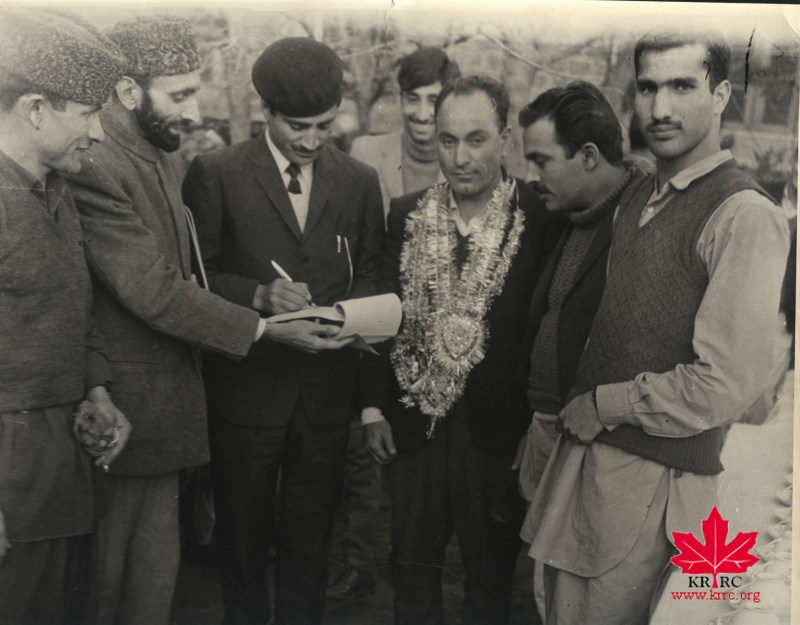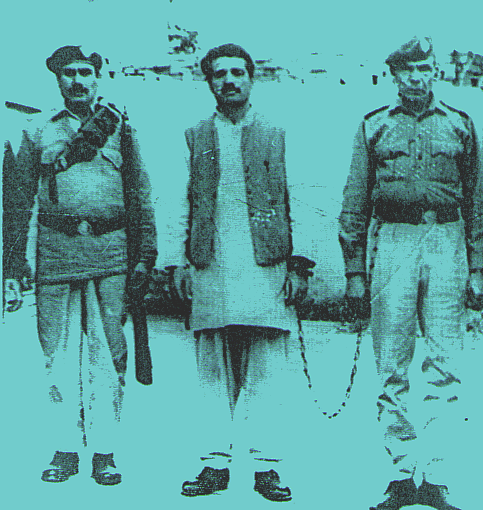Tribute
Maqbool Butt: A Symbol of Kashmiri Patriotism.
A Tribute By Zafar Khan
Sixteen years ago late Indira Gandhi the then Indian Prime minister ordered
the judicial murder of Maqbool Ahmed Butt. Sixteen years on his body remains
buried in some corner of the notorious Tihar gaol. Despite repeated demands
from the people of Kashmir and indeed his family Shaheed-e- Kashmir's mortal
remains have not been handed over. It appears that the Indian authorities are
just as frightened of Maqbool Butt today as they ever were, in letting people
of Kashmir to reclaim the mortal remains of Maqbool Butt, lest he becomes
even greater focus of national aspirations and determination for the masses!
An empty grave awaits his remains in the martyrs' cemetery in Srinagar,
along side graves of thousands of men, women young and old alike, who became
victims of militarised violence and oppression in Indian occupied part of
Kashmir, especially since 1988. Martyrs' cemetery in Sirinagar will indeed
be a fitting final resting place for Maqbool Butt, as he truly, has become
the embodiment of Kashmiris' national spirit for freedom and patriotism today.
Maqbool Butt was born in 1938 in a village called Trigham, Kupwara district
in the valley of Kashmir, now within the Indian occupied part of the state.
He hailed from an ordinary Kashmiri background. Like countless other ordinary
people of Kashmir under the despotism of the Dogra regime, his family too
eked out a living, relying mainly on the produce of small land holding and
whatever extra available work.
His mother passed away a little before his teens and his father remarried
soon. Maqbool Butt had one real brother- Ghulam Nabi and five half brothers
and sisters. He never fully reconciled with the loss of his mother. But from
all accounts his step mother was devoted mother to all children and Maqbool
Butt was never made to feel the lack of maternal warmth by his step mother.
His early education up to matriculation in 1954 was obtained at his village
school, which was only elevated to secondary level as a result of campaigning
by himself. He went to Baramulla for higher education at St. Joseph's
College, which was run my missionaries.
Maqbool Butt's political activities were monitored by the authorities in
Indian held Kashmir, which got him into trouble with them from time to time.
This meant that he would be forced to go underground on occasions for weeks
and some time months. Eventually he had to cross the ceasefire line into Azad
Kashmir in 1958. While in Azad Kashmir he was able to concentrate on his
political activities with relative ease. He made use of this apparent freedom
in Azad Kashmir, along with his colleagues notably Amanullah Khan and others
to plot future strategies for energising the masses from political and
ideological slumber. He returned to Indian held Kashmir in 1966 as part of
this newly formulated strategy. He was arrested and sentenced to death in
1968 accused of an offence he did not commit.
However he escaped from Sirinagar gaol and once again crossed over to Azad
Kashmir. In 1976 he went back to the Indian held part of his motherland. He
was arrested again and remained incarcerated until 11th. February 1984, when
under an illegal and vindictive political decision, late Indira Gandhi
ordered his execution. It is important to note and recall that, although
execution of Maqbool Butt had become extra judicial and illegal under Indian
constitution, as he had been on Death Row for over two years, and therefore
under the Indian law his sentence should have been commuted to life
imprisonment; the late Indian Prime Minister still gave this act of murder a
legal air by obtaining the 'black warrant' from the 'Kashmir state
government' signed by the 'chief minister' Farooq Abdullah. In other words
while the decision to hang Maqbool Butt for a crime he did not commit was her
and her alone, she nevertheless made Farooq Abdullah responsible for this
despicable act.
For centuries people of Kashmir have struggled to regain the freedom they had
lost towards the end of Sixteen Century. This struggle, primarily has always
been to re-assert their national, political and geographic identity, as well
as of course, to maintain a particular religious, social and cultural
heritage, peculiar only to peoples of all the regions within Kashmir as a
whole. Ever since 1586 when the great Moghul emperor Akbar, succeeded in
subjugation of Kashmir because of political rivalry and divisions within the
Kashmiri ruling elite, the struggle against outside rulers however has
continued in various forms. At the heart of this struggle and resistance has
been the firm desire of Kashmiris to be masters of their political destiny!
For the masses it has not always been an easy course of action to undertake,
simply because non Kashmiri rulers have never been short of quislings willing
to do their bidding for personal political gain. Thousands of Kashmiris have
given their precious lives for freedom throughout these centuries. Those
who resisted were even flayed alive for the expressed purpose of deterrence
and dampening of the natural desire and disposition of the people to be free.
Despite countless atrocities inflicted on the masses as a direct consequence
of rule by outsiders and their local agents, quest for freedom has never been
given up by them. Instead an abiding sense of sacrifice has become a hallmark
of Kashmiri psyche.
It is within this national and historic context of Kashmir, and the
inevitable socio- cultural and political backdrop, and indeed the wider
societal framework, which impacts on both the collective and individual
experiences and consciousness of subjugated people. This then provided the
developmental broad basis, which politically and ideologically nurtured
Maqbool Butt; and above all imbued him with the spirit of sacrifice and
indeed the intense sense of national duty.
The path that would lead him to freedom, justice and national dignity had
therefore been charted and trodden by countless generations of his
compatriots. Maqbool Butt simply exemplified and epitomised the best and the
most honoured of the traditions and heritage of his peoples' struggle for
freedom. It is in this context that his co ideologue, close friend and
colleague Mr Amanullah Khan has said of him that ' Maqbool Butt was not just
a man of handsome features, good character and charismatic personality, but
a man who espoused and advocated a solidly inclusive revolutionary ideology
for the liberation struggle, and exuded self respect, confidence,
forbearance, boldness and courage, all the qualities which are symbolic of a
great man'. An other of his close colleagues and veteran Kashmiri leader of
the struggle Mr Khaliq Ansari said of him that he is an 'exalted son of the
soil and pride of Kashmiri people, and his martyrdom has energised the
nation after four centuries of subjugation, to openly confront an Indian army
of six hundred thousands like lions'.
Maqbool Butt was a man of action, a man of deeds and not just a man of words.
What this meant in the context of Kashmiris' quest for freedom, was that he
practiced what he preached. This in reality was a marked departure from the
rather subdued, subservient nature, and approach of articulating the national
political attitude which had been a pre occupation of the traditional
leadership in Kashmir, especially since 1947. A general worldview of the
traditional leadership on both sides of the divided line in Kashmir had been
based on the belief that a Muhammad Bin Qasim would come and deliver them
from political servitude. Maqbool Butt rejected this approach and infact
broke this mould and self delusion which this national attitude had come to
represent and foster. Even within the Plebiscite Front, his own organisation
committed to the objective and ideology of an independent and sovereign
status for Kashmir, opposed his methods of direct action and ideology and
philosophy of taking the fight to the enemies of Kashmiri independence, in
other words armed resistance. setting up of the National Liberation Front
NLF, the forerunner of the JKLF in 1965, and the stiff opposition which he
and Mr Amanullah Khan encountered from their parent body, the Plebiscite
Front reflected this general attitude to some extent. This was so despite
that fact that the PF leaders were otherwise highly committed contemporary
intellectual revolutionaries, who simply failed to see the practical
visionary in Maqbool Butt, Mr Amanullah Khan and indeed a few of their
comrades such as Mir Abdul Qayyum, Mir Mannan, Major Amanullah and one or two
others.
Whatever machinations and conspiracies against the freedom struggle in
Kashmir, Maqbool Butt's legacy is synonymous with freedom and remains a
poignant and potent reminder that the flame of freedom in Kashmir can never
be extinguished by use of brute force, and indeed by denial to Kashmiris
their inherent and inalienable right to exercise the unfettered expression of
self determination. Maqbool Butt was uncompromising on centrality, finality
and unconditional basis of Kashmiris' right over the future status of Jammu
Kashmir.
Central to this position is the ideology of Kashmir's independence and
reunification; and those who are steadfast in the advocacy of this ideology,
are indeed continuing Maqbool Butt's legacy. There are no half measures on
this principle. Restoring to his nation sovereignty, national identity and
dignity, which free nations enjoy and take for granted every where else, was
the only mission of Maqbool Butt's life. He lived and died for the
achievement of this national goal and has stamped an indelible mark on the
shape and contours of Kashmiri politics of liberation struggle. This is one
major reason why even his detractors are forced to claim him as their own.
While there is an implausible level of expediency and hypocrisy within power
politicians, and Kashmiri politicians are no exception, they nevertheless are
sensitive to political realities. This may well explain their favourable
attitude to Maqbool Butt today. They may want to subvert his message in
reality but are mindful of Maqbool Butt's popularity within the masses.
In an age when freedom has become a by word in the world with nations and
peoples of all geographical, political, economic sizes and shapes asserting
their right to sovereignty, it appears inconceivable that Kashmiris remain
denied of what is so easily and routinely available elsewhere! It is in
keeping with the contemporary political philosophy and the sentiments and
aspirations rekindled in the masses by Maqbool Butt, and the many sacrifices
which have been offered by them, not only over the past twelve years but
during the last half century, that equality, justice and democracy should not
merely remain a rhetoric and cliché, but instead become a reality for people
in Jammu Kashmir today. Freedom and reunification of 13 million people of
divided Kashmir will bring all kinds of economic, social and cultural
advantages in Kashmir. This process will be of immense benefit also to
Kashmir's neighbours India and Pakistan! Their people will become free from
the corrosive and devastating financial and economic burden of maintaining
huge military presence in the territory. Not only is this Indo- Pakistan
military presence hostile to each other, it is also not consistent with the
aspirations of Kashmiri people; indeed it is detrimental to their future well
being. For it is not in the interest of any people or nation to be bone
of contention between two powerful countries, as indeed Kashmir and its
people are sandwiched between India and Pakistan.
Now that both India and Pakistan are nuclear powers, the international
community has a great responsibility in ensuring that everything which helps
towards a just solution of the issue and brings peace and prosperity to the
region is harnessed and brought into the equation This has to be under take
without fear of Indian intransigence and indifference to third party
mediation. Nevertheless in keeping with the sacrifice and the ideology of
shaheed-e- Kashmir, Kashmiris cannot and will not compromise on their
inherent and inalienable right and in the demand demanding and struggle for a
sovereign and independent Kashmir.
Realisation of Maqbool Butt's goal will be the most deserving and fitting
tribute to the martyr of the nation. May he on the sixteenth anniversary of
his shahadat continue to inspire the nation in fulfilling his dream of
freedom and national dignity. Ameen.
Zafar Khan
JKLF, UK. 10th Feb. 2000


